|
Home
Away from Home - Saigon, Vietnam
Coming to Vietnam has become a pilgrimage of sorts,
at least for me. The political events that have shaped this tiny nation and everyone involved, for
good or bad, is directly responsible for my being
here. Half Vietnamese, but all American. You come
with luggage, all your expectations, not only from
what we've learned in the classroom about a conflict that no one really understands, but for me,
everything
I knew from my parents. An American soldier and a
young Vietnamese girl. The swirl of events
that brought them together and made something good
in a bad time. To try to piece things together and
come home with a better sense of my heritage and
fate.
Love
Story...
The
draft notice came in the mail. "You are to report to ..."
Hurrying down to the Air Force Enlistment office, my father, enlisted
immediately and the officer back dated it one day. Once in the air
force, he was given his choice of duty. Piloting was out of the
question, as was his second hobby after flying, photography after he
tested positive for a small amount of color blindness. Instead, he
signed up for a special program being run in Vietnam, where he would be
teaching young Vietnamese pilots English so they could then come to
America for fighter pilot training and then return to wage the war. When
I queried about why he actively chose to go to Vietnam when other were
running to Canada, he said he wanted to do his duty and also, as a young
kid growing up in a small town, Vietnam was exciting, and a world away.
He was stationed in Saigon, near Cholon, the Chinese quarter. Each day
he taught English to young, eager South Vietnamese boys. He told me
about one close call. The bus that picked up the instructors and
deposited them at the school had just dropped them all off outside the
building. As it pulled
away, it hit a bumped and exploded, killing the innocent Vietnamese
driver instantly, but no one else, as everyone had just exited. My
father was slightly burned but nothing serious. Such was his
existence.
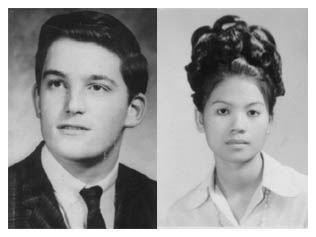
Kim
came from a wealthy, rural, South Vietnamese family that had been
decimated by the philandering ways of the patriarch. Her father left the
family at the first sign of trouble and with twelve brothers and sisters
to take care of, my mother went to work to help out. She did laundry for
GI's on the base and a very slim and pretty teenager, she caught the eye
of all the guys. Flirting with them in a friendly way to get more tips,
she would often say to them as they picked up their freshly laundered
and pressed clothes, "pay what you like." Shrew and wise, she
got far more than she ever would have asked. Well, Rob wanders in, and
upon receiving the same reply, he left her with some small pocket
change, and succeeded in both infuriating and intriguing her. Who was
this cheap ass???
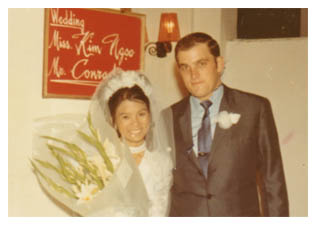
The
relationship became very friendly and my father did many small favors
for my mother's family. Buying them things from the Base Shop, things in
very short supply in Saigon, helping in the many small ways that are
little miracles in war time. Eventually, his tour ended and he was
shipped out. But he couldn't stop thinking of her...and after some time
back in the States, he signed up for a second tour and return to make
her his wife...if, he could survive the two years. They were married in
April of 1972, and I was born in January of 73, shortly after my mother
set foot in America in Dec of 72..
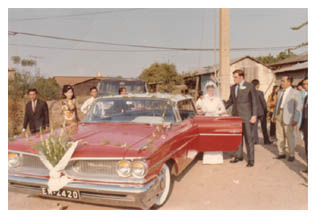
We land in muggy weather,
December 1, 1999, almost 28 years to the day that my father and mother
fled from the same place, Tan Son Nhat Airport,
Saigon, or Ho Chi Minh City as nobody calls it.
I waited in the line, my palms sweating profusely, much as they did in
the Vietnamese Embassy in Thailand when we secured our visa. I am not
sure what I feared. American passport or Vietnamese face. Communist
government or faceless bureaucracy. And...
it was a breeze. All my worries about
bureaucratic
red tape, American passport, incorrect visa, etc.
No problems. We sailed through and the border guard
seemed to appreciate my Vietnamese words. The
language
has actually come back to me pretty quickly. Hearing
it all the time makes a world of difference and I
find
myself listening in on conversations, hearing people
when they think I don't understand. We bought some
spring rolls in the street the first night and when
we asked how much, the women turned to another and
said in Vietnamese, "how much should I charge
them -
how much do you think they will pay?" Often,
when we
are passing someone in the streets, I hear them say,
"Look at her face, she looks like
Vietnamese" and I
turn and say, "yes, I am." It has opened
many doors.
People here have been so friendly, so curious. When
they hear we are from America, they have so many
questions. Some know of Chicago, "Big city, Big
buildings, Big Lake." Others think America is
just
California. When they find out I'm Vietnamese, they
understand, they know ... my background.
We haven't seen
a lot of Americans here. The place is
actually overrun by the French. They come in droves-
nostalgic for colonial times, in much the same way as Britains are
drawn inescapably to the lure of India. Here, we see the
occasional
Vietnam vet. He's easy to spot. He will be in his
fifties and usually with a Vietnamese wife. He walks
around saying the few Vietnamese phrases he learned
during the war, in a very familiar American drawl and I recognize them, because I have
heard them all before. "Choi oy!" Everything seems strangely
familiar.
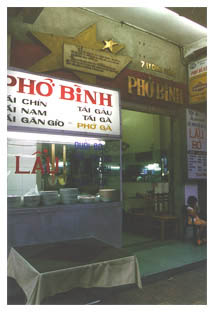 Being American though, is still a double-edged
sword. Many of the major 'tourist' attractions are
tied
to the 'American War' as it's called here, much to my surprise.
Something I never gave a thought to, but hammers the point home from the
other side. We visited one infamous restaurant, Pho Binh with a
checkered history. The owner was an underground communist and used his
restaurant as a place to plan bombings in Saigon. Many
an unsuspecting GI ate there, never knowing how close death lay. I felt
uncomfortable inside. Especially after browsing through his guest book
that was out on display. Inside, tourists had wrote things like
"you fought the good fight and great pho!" Was this guy the
hero these tourists and his government said he was? Being American though, is still a double-edged
sword. Many of the major 'tourist' attractions are
tied
to the 'American War' as it's called here, much to my surprise.
Something I never gave a thought to, but hammers the point home from the
other side. We visited one infamous restaurant, Pho Binh with a
checkered history. The owner was an underground communist and used his
restaurant as a place to plan bombings in Saigon. Many
an unsuspecting GI ate there, never knowing how close death lay. I felt
uncomfortable inside. Especially after browsing through his guest book
that was out on display. Inside, tourists had wrote things like
"you fought the good fight and great pho!" Was this guy the
hero these tourists and his government said he was?
In Saigon,
we visited the War Remnants Museum (it's former name
being the American War Crimes Museum but changed in
this new era of global tourism.) It was filled with hundreds
of horrible photos, many of them from US sources
showing unbelievable atrocities, including the My Lai
Massacre. Aside from the few tourists, the place is a
favorite of school groups, leading scores of young
uniformed children through their history and past.
All
is not forgotten, it seems. For the first time, we
were on the 'other' side. The bad guys... but it's
really not that simple. Not really good or bad,
just 'other' People are moving on, and these relics
seems more like obligatory history lessons that everyone is bored
by and hungering for unhinged capitalism.
Another favorite site is the infamous
Cu Chi tunnels,
home of the Viet Cong just outside Saigon. Based
underground, they launched 'successful' attacks and
ambushed soldiers and then disappeared into back into
them. We visited them and crawled through the
tunnels,
now widened for big western tourists, although we did
see some original ones. They looked as if a snake couldn't crawl through them. Much of the
official
government lingo centered on all the heroics of the
Viet Cong in repelling the invaders, and outside the
tunnels, they exhibited many home-made traps set for
wandering soldiers. Our guide, using a stick set them
off, one by one, and with each echoing crash, we
cringed at the thought of American soldiers falling
prey. It was also not a particularly enjoyable visit.
But then you look harder and see past the war
industry
turned amusement park stuff, and find the real
Vietnam, embodied in the loud, brash Saigon. A
modern,
almost cosmopolitan city that has risen from the
ashes of 75. In 1986, the communist government, under
desperate economic straits, decided to open up the
economy to outside world. Western businesses rushed
in and Vietnam has been looking forward ever since.
It is here, more than anywhere else that the economic
changes sweeping Vietnam, and any negative social
implications, are most evident.
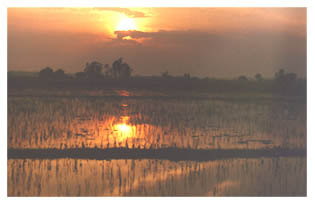
We
took a visit to the Mekong Delta, the fertile lowlands of south and
considered the rice bowl of Vietnam. It is a swampy jungle; humidity
hangs in air and people traverse the many canals and waterways. In some
of the larger inlets, there are grass-roots industries selling peanut
candy and objects fashioned from coconuts and coconut wood. Great place
to pick up those salad tongs you were needing.
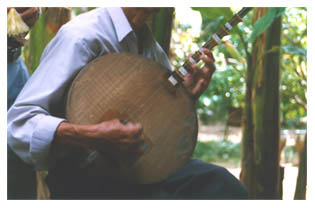
It
many ways, the Mekong Delta hasn't changed at all, but in the mist
fundamental of ways, it has. The greatest change in Vietnam has
originated not in the cities but in areas like this. When communist collective farming became a thing of the
past,
Vietnam went from famine to exporting rice in a mere
two years. People were allowed to work for themselves, and they
caught the entreprenurial bug, hard. Now, the Mekong Delta is
a rich and fertile land and back in the city, Saigon's
streets are filled with Coke. On a street corner,
Motorola, Nokia & Ericcson with battle for the
consumer's cellular soul. MTV Asia blares from the
TV, and Apocalypse Now is a trendy hip new club.
It makes you wonder if this is what we fought the war
for. What they fought the war for. Is this the
communist utopia they envisioned? is this the communist
hell we expected to find?
One new industry that has risen, the fake-book industry. Rather than pay full
price for a new paperbook, check out the scores of
bootleg paperbacks, all created on a good copier. We have seen the range, from fancy copies that go so far
as to have a laminated color-copied cover and actual
binding, to a simple bad photocopied cover and a
staple down the middle. But the words are there to read and they are still the same, save for the
occasional missing page. We have even seen the production houses ... people sitting on the sidewalk
with a stack of photocopies, trimming pages down and
binding them. And they seem to know what people want
to read, all the latest backpacker favorites ...
Alex Garland's The Beach and Sutcliffe's Are You
Experienced as well as War books, such as Greens's
The Quiet American or Le Ly Hayslip's Heaven and
Earth, now a major motion picture. And of course, all
the travel guides to all the surrounding countries.
Never again, will you pay full price.
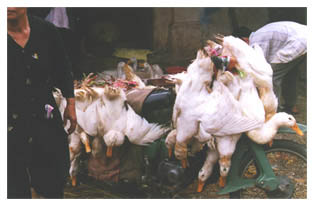
Saigon is a moto city!
Motor-scooters everywhere. While a few cars rumble by
once and awhile, usually a sleek lexus of a newly
minted millionaire, the streets are packed with scooters and bicycles. It strange to look down a
crowded streets and see only floating bodies rushing
by. The de rigeur outfit of the trendy young women is
a short sleeve pants suit, sunglasses, bandana
wrapped
around the face, long sleeve driving gloves and high
heels perched atop her pink and grey Honda Dream.
Seems
that lighter is better and fashionable women avoid
the
sun at all cost. Having a suntan brandishes you as a
country peasant girl having to work the rice paddies.
The saying here is "No moto, no honey" On
Sunday
nights, Dong Khoi Street, their Magnificant Mile, is packed
with young people, dressed in their finest, and
cruising slowly down the streets. Two girls here wink
at two guys there, young couples laughing as they
breeze by. And the traffic is insane! No one obeys
traffic signals and many streets don't have them at all.
People
just enter intersections at random, but since they
are
on two wheels, they are far more adept at avoiding
each other. As for lanes, try about 20 on our
standard
two lane road. All the motos push to the front and
line
up on the starting line, revving, waiting for the signal. As for those of us using our
own two feet, we learned the trick from the locals.
You just step right in and walk across at a very
steady, even pace. Then your movements are completely
predictable and you can easily be avoided. It all
goes
wrong when you panic and try to dart out of the way
or
stop to avoid a moto. Then, they just run right into
you. We've seen it. No, the best, is actually to just
walk straight ahead and not look at all. You could
close your eyes and step out and you would be fine.
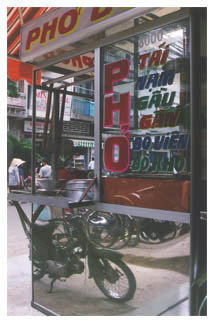 As for the food, heaven! just like mom made. From the
delicious pho (noodle soup) to the incredible grilled
meats and spring rolls and anything in lemongrass
chili
sauce. YUM! And the beer. Vietnam happens to be the
biggest beer-drinking country in Asia, much to Doug's delight. They love the
stuff and it shows. Every region has its own beer,
add that to the nation wide brands such as Tiger, BGI
and 333, and it's a plethora to choose from. 333, even my father
remembers fondly. By
volume it's cheaper than Coke and in some cases,
water.
A big bottle, .65 liters, costs about 70 cents.
Doug has been imbibing quite abit. If he sounds like
a
lush, you're right. As for the food, heaven! just like mom made. From the
delicious pho (noodle soup) to the incredible grilled
meats and spring rolls and anything in lemongrass
chili
sauce. YUM! And the beer. Vietnam happens to be the
biggest beer-drinking country in Asia, much to Doug's delight. They love the
stuff and it shows. Every region has its own beer,
add that to the nation wide brands such as Tiger, BGI
and 333, and it's a plethora to choose from. 333, even my father
remembers fondly. By
volume it's cheaper than Coke and in some cases,
water.
A big bottle, .65 liters, costs about 70 cents.
Doug has been imbibing quite abit. If he sounds like
a
lush, you're right.
In Vietnam, religion is divided between Buddhism and
Catholicism for the most part. On the Buddhist side,
we have seen quite a few pagodas here. They are a unique mix of Buddhism, Confuciousism, and ancestor
worship that seems to be particular to Vietnam. There
is always food left out to feed the souls of their
ancestors, and one must worship them for good karma.
In Cholon, the Chinatown of Saigon, there are about
ten pagodas in a relatively small area.
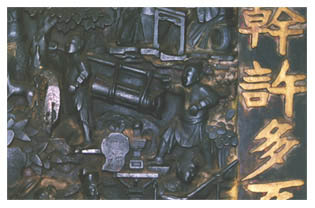
One day, we
set out to visit them all. Along the way, cyclo
drivers
pester you non-stop to take a ride in their cyclo.
Well, two such guys were more than persistent. They actually stalked us. First, they would point out the
way to the next pagoda, but then it got weird, when
they would be waiting at the next one, and the next,
and the next. They knew exactly where we were going,
and we couldn't shake them. We tried hiding in
alleys,
taking what we thought were different routes. We
would
be no good as secret agents, way too obvious.
They were hoping that when we finished for the day,
we would take their cyclo back to central Saigon, and
they were willing to follow us for hours for the hope of a single fare. That's pretty
desperate.
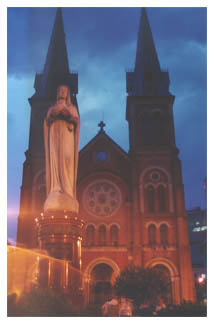 Catholicism is also big here, led by early French
missionaries. Saigon has a big, beautiful cathedral,
very similar to Notre Dame in Paris, but no doubt
the
bright green neon halo on Mary and Jesus inside was a new
addition. People are far more fervent here. They are
like born-agains. There are churches everywhere and the masses are packed and their are
loudspeakers rigged up outside in the courtyard. The
church fills to capacity and then they just sit
outside, content just to listen. The mass appears to
be exactly the same, which is reassuring when it's in
Vietnamese. You can still follow along and stand and
sit and kneel at the same time. The only difference
was the peace offering to your neighbor. Instead of
shaking hands, they just nod their heads one way,
then
the other. That's all. And then the strangest thing.
The segregation, women on one side, men on the other.
The occasional tourist would break the rules, then
they
would be lightly tapped and asked to move. Prior to
mass, they chant, alternating between women and men,
back and forth. When we poured out of the mass, we
were surprised to see the people gathering around the
Mary statue out front. There appears to be a cult of
Mary here as well. Then we turned and saw the big,
gothic cross atop the church was now ringed in green
neon. nice touch... Catholicism is also big here, led by early French
missionaries. Saigon has a big, beautiful cathedral,
very similar to Notre Dame in Paris, but no doubt
the
bright green neon halo on Mary and Jesus inside was a new
addition. People are far more fervent here. They are
like born-agains. There are churches everywhere and the masses are packed and their are
loudspeakers rigged up outside in the courtyard. The
church fills to capacity and then they just sit
outside, content just to listen. The mass appears to
be exactly the same, which is reassuring when it's in
Vietnamese. You can still follow along and stand and
sit and kneel at the same time. The only difference
was the peace offering to your neighbor. Instead of
shaking hands, they just nod their heads one way,
then
the other. That's all. And then the strangest thing.
The segregation, women on one side, men on the other.
The occasional tourist would break the rules, then
they
would be lightly tapped and asked to move. Prior to
mass, they chant, alternating between women and men,
back and forth. When we poured out of the mass, we
were surprised to see the people gathering around the
Mary statue out front. There appears to be a cult of
Mary here as well. Then we turned and saw the big,
gothic cross atop the church was now ringed in green
neon. nice touch...
Xmas is HUGE, not really as a religious holiday,
the Buddhists seem to embrace it as well. It's more
of a national holiday. There are so many stores
selling xmas trees and ornaments and a sure crowd-
pleaser, baby santa suits, complete with fake beards.
One exception to the Buddhist-Catholic bloc is the
cult of Cao Dai, rather more a blending, so to speak.
Founded in 1926 as a religion that blended all the
best of all the great religions. Their prophets are
Buddha, Jesus, Laotse, Confucious, Moses and
Mohammed.
Main influence are Buddhism, Confuciousism, Islam,
Taoism and Christianity. And strangely enough, their
spirit guides consist of a Vietnamese poet, a Chinese
general and Victor Hugo. Yes, you heard correct. He
is
considered the patron spirit guide for us westerners.
Much of the faith centers on seances and
communicating
with the spirit guides, which is how Victor Hugo came
into the picture, much to their surprise as well as
ours. Other spirits occasionally heard from include:
Joan of Arc, Descartes, Lenin, Pastuer, and
Shakespeare (who unfortunately hasn't been heard from
since 1935.) The result of all this fusion, is a
colorful and eclectic potpourri that is astonishing
in
its imaginative garishness.
After, all this religion, we took a night off to
check
out what the locals enjoy for entertainment. We
visited
a small outdoor theatre. You pay for the drinks,
entertainment is free. We were treated to the
spectacle of modern Vietnamese pop, singing their
favorites and ours, specifically alot of Vengaboys
and Aqua (the Barbie Song) but thankfully no Brittany
Spears. This was punctuated by the occasional
vaudeville acts, we had comedy and plate-spinning.
A pleasant night out, and afterwards we fought our
way through the hoardes off people gathered in the
streets listening rather than paying.
Well, Saigon humms and buzzes with a certain energy.
We hope that all of Vietnam has caught the same ferver, and if so, they have alot to look forward to.
And so do we.
It good to be home.
Over and out, good buddies
ann and doug
index | back
| next |
